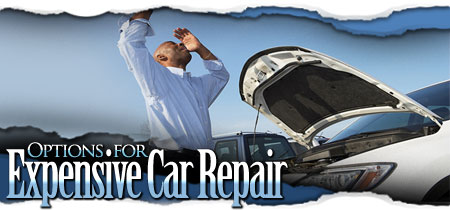|

How to Save Money on Pricey Car Repairs Kyle Busch
Have
you ever been in the tough position of owning a vehicle
that is not worth too much money but that needs an expensive
repair? Maybe you have recently even dumped some pretty
good change into the vehicle for items like new tires,
a battery, a muffler, etc. And now it needs a major
repair!
You realize that you cannot sell the vehicle for much
without getting it repaired, and you know that you can't
afford to trade it in on another vehicle.
Given today's soft economy, what a time to face an expensive
vehicle repair. What can you do? What are some possible
options?
A driver recently wrote to ask my advice. The woman
owned a 1998 minivan with 125,000 on the odometer. She
explained that the engine was losing oil, smoking at
idle, and making a knocking sound. Additionally, it
was the only transportation for her family.
She went on to ask about having it fixed or buying another
vehicle. If my answer was to have it fixed, she inquired
if I knew of an honest mechanic in her community. It
turned out that she still owed about $1,000 on the vehicle,
and she could not really afford to buy other transportation.
I knew that the smoking engine would require new oil
rings and that the knocking could indicate the need
for a total engine rebuild costing anywhere between
$1,500 and $2,500. Since it had over 125,000 miles on
the clock, repairing it at a private garage would mean
dumping a lot of money into a vehicle with a limited
value.
Since I was not familiar with her community, I could
not suggest a mechanic. I did suggest, however, that
she use the telephone book to contact vocational technical
schools located up to about 20 miles from her home.
I suggested that she inquire if the schools had automobile
(mechanical) repair classes and, if so, for her to get
the instructors' names and jot them down.
If possible, she would then make an appointment and
take the minivan to an instructor for his unbiased evaluation.
She would then see if the instructor and the class could
repair the engine. If one instructor could not help
her, she would go on to the next.
The cost of parts needed for the repair would be about
$150-$250 (the labor costs would be eliminated). The
parts would cost her less money since they would not
be marked up as can be the practice at dealership or
private garages.
If the engine could not be rebuilt, the instructor could
likely identify a used engine from a salvage yard, and
the class could possibly install it in the minivan.
The used engine would cost about $250-$300. And even
if the class were unable to work on the vehicle, the
instructor could likely contact reputable salvage yards,
some of which would also install the engine. If needed,
the instructor could contact a private mechanic (with
whom he is familiar) to have the engine installed. The
used engine would likely cost $250-$300 and the instillation
would cost about $200-$250.
Thus, rather than having to pay off a $1,500-$2,000
repair bill, the driver would have the vehicle repaired
for about $150-$550. Regardless of the chosen option, the instructor's informed and unbiased advice
is the key to ensuring the driver's best interests.
The
owner will have to spend some time doing telephone work
and meeting with the technical school instructor. It
is best to make contacts well before the end of the
school year. Also, the driver will need to make arrangements
to car pool or borrow a relative's car to drive when
the vehicle is being repaired. However, such work can
pay the owner a pretty good hourly rate in savings when
faced with that expensive car repair.
— Kyle Busch is the author
of Drive the Best for the Price: How to Buy a Used Automobile,
Sport-Utility Vehicle, or Minivan and Save Money. For
more information about the book, call 1-800-839-8640
or visit Drive the Best. |